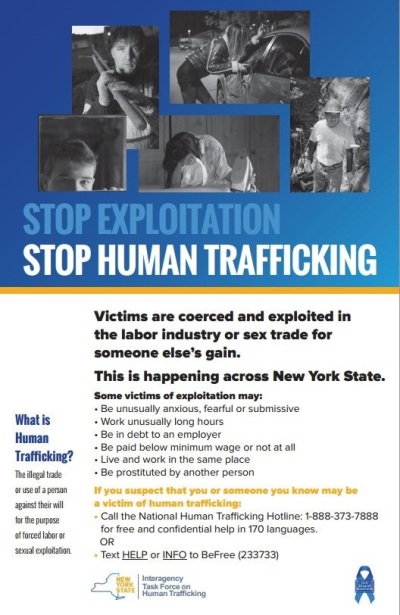New York tackles human trafficking through state-wide initiatives

GUILDERLAND, N.Y. (Christian Examiner) -- In an added effort to help women fallen prey to human trafficking and the exploitation of abusers. New York Governor Andrew Cuomo declared January Human Trafficking Awareness month Tuesday, Jan. 13, during a press conference where officials unveiled a new poster campaign to raise public awareness.
The posters, which reportedly will hang in service areas along the Guilderland service area thruway, an area including Interstate 90 between Albany and Schenectaday, are not the state's first effort to help women victimized by the billion-dollar industry.
Although a number of cities have similar programs in the U.S., New York launched the nation's first state-wide Human Trafficking Intervention Court (HTIC) in October 2013. The 11-court program, presumes defendants charged with prostitution are victims at risk instead of criminals.
New York State Chief Judge Jonathan Lippman launched the initiative to "break the cycle of exploitation and arrest," and help sex workers have "productive lives rather than sending them right back into the grip of their abusers," The Daily Beast reported.
Ultimately, Lippman said HTICs address the underlying reasons prostitutes are before the courts to begin with.
After 15 months HTIC's success stories exist in the testimonies of women like the Mexican immigrant trying to help other Latin Americans escape the sex crimes she endured.
Still, the program faces the enormous challenge of using the criminal courts to incite social change in the warped culture of sex as a trade. While some women are trafficked within the industry involuntarily, others claim their involvement is by choice and resist being called "victims" altogether.
One peer-led group called the Red Umbrella Project (RedUp) that claims it exists as an advocate of people in New York's sex trade industry, went so far as to conduct an investigation criticizing HTIC's first year. The RedUp report highlighted racial profiling among other topics including the incongruence of reclassifying prostitutes as victims, but treating them as criminals.
"No other charge calls for the person being exploited to be arrested," the RedUP report states.
Anti-trafficking supporter and former Judge Judy Harris Kluger who helped start the HTIC program called the report a "dangerous misconception" and a "flawed analysis."
"The notion that most people affirmatively choose prostitution as a preferred way of life is pure fantasy," Kluger said, adding, "The Human Trafficking Intervention Courts offer an unprecedented lifeline to many."
Judge Toko Serita's currently presides over the Queens courtroom founded a decade ago that serves as the model for the state-wide HTIC program.
The New York Times reported Serita acknowledged the criminal justice system was not ideal to help the victims of human trafficking to feel less like a criminal. However, the social services and counseling the women received in lieu of jail time could eventually serve as a point to re-enter society for those being trafficked against their will, she said.
"It's a trigger mechanism to establish contact between individuals and service providers," Serita noted. "We know that five sessions is not necessarily going to change some people's lives, but if they can establish meaningful contact with somebody else that can be used in the future, that's what we're hoping for."
RELATED STORIES
Church fights slavery & sex trafficking of Nepal's women & orphans
Human trafficking victims rescued in new reality TV show
'Sarah' was sex trafficked by her own husband
Christian university offers sex-trafficking survivors free education